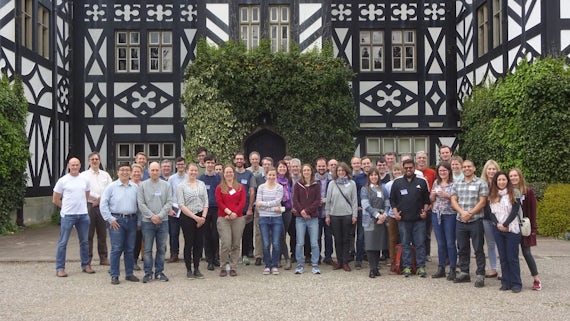Identifying challenges and opportunities in interdisciplinary learning: summary of the 2019 WET Weather workshop
15 Mai 2019

Understanding how extreme weather events, such as intense rainfall and wind storms, may change under a warming climate is one of the greatest challenges for climate researchers.
Extreme weather events pose the greatest environmental risks to the world, as noted in the 2019 World Economic Forum global risk report, and require interdisciplnary collaboration. To tackle some of the challenges associated with the study of extreme events, 41 statisticians, engineers and environmental scientists from the US and Europe came together for a two-day workshop at Gregynog Hall (mid-Wales). This was the first of two workshops on this theme, organised by Dr Kirstin Strokorb, Prof Owen Jones and Dr Marie Ekström, and funded by the Royal Statistical Society’s Mardia workshop grant with contributions from Cardiff Water Research Institute.
The goal of the 2019 Workshop on Extremal Trends in Weather (WET Weather) was to create a discussion-friendly forum enabling different scientific communities to freely explore ideas, priorities and future collaboration opportunities.
Keynote lectures were given by six lead scientists in their field, each representing a different aspect on the study of extremes:
- Simon Brown (Lead Scientist and Climate Extremes Research Manager at the UK Met Office)
- Hayley Fowler (Professor of Climate Change Impacts, Newcastle University)
- Philippe Naveau (Laboratoire des Sciences du Climat et de l’Environnement, LSCE-IPSL-CNRS)
- David Stephenson (Director of the Exeter Climate Systems (XCS) research centre)
- Jonathan Tawn (Director of STOR-i, Lancaster)
- Chen Zhou (Professor at Erasmus School of Economics/De Nederlandsche Bank)
The workshop also hosted a poster session, several short talks, and an afternoon walk that provided time for reflection. The topics discussed included an overview on state-of-the-art knowledge, recent observations on changes in physical processes and mathematical advances in the analysis of extreme events.
Geert Jan van Oldenborgh, climate researcher in climate analysis, shared his experience in an inspiring talk setting the scene for a late evening panel discussion elaborating on questions arising during the first two days of the workshop.
On the last day, several challenges were discussed including:
- Accurately applying statistical models to physical processes at different spatio-temporal scales
- Handling different formats of climate change information
- Scientific language barriers
Each of these challenges highlighted the need to maintain interdisciplinary research.

By overcoming communication barriers, we can identify opportunities for new and existing collaboration, such as developing methods to better understand spatio-temporal trajectories of extreme events.
This concluding discussion together with a participant survey will help format the structure and content of the second WET weather workshop planned for 2020.
Please see the Water Research Institute events page for updates.


